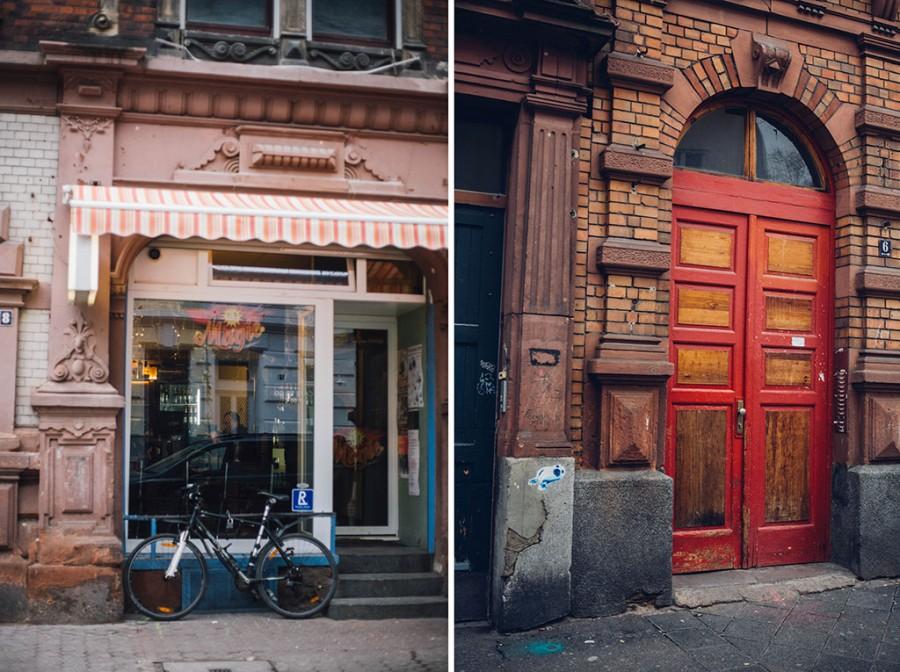“Denglisch”: Learning German in Germany
A shaky grasp on the German language leads to some humorous misadventures while studying abroad.
February 11, 2016
“Ausweis?”
I looked back at the Woolworth’s cashier blankly, as I scrambled to fit my purchases into the disposable bags I had brought. She repeated herself, and then again — but all I could do was stare at her in a panic. What does that even mean? I fretted, as the line of impatient German customers behind me grew.
The fourth time the cashier asked me, a customer in the back yelled “I.D!” I blushed and pulled out my license. Of course, I berated myself. Pay with a card, get asked to see I.D. It made sense, and I mentally added “Ausweis” to the ever-expanding list of useful German words that I hadn’t been taught in school.
Mark Twain once wrote an essay titled “The Awful German Language,” in which he lamented: “Surely there is not another language that is so slipshod and systemless, and so slippery and elusive to the grasp.” When I moved to Germany to study abroad, I learned exactly how slippery and elusive German can be.
The semester before I left, I stumbled through an introductory German class, where tricky nuances and difficulties of the language began to present themselves. Instead of one neutral “the” article, Germans have three: der (masculine), die (feminine), and das (neutral). There are no indications as to which words are which gender, meaning it’s up to the student to memorize the article along with the word itself. Nouns are capitalized, while adjectives have several possible endings, depending on where they sit in the sentence — and the longer the word, the better.

Despite the “B” I received in the class, and my not-so-tenuous grasp on the language, I remained recklessly optimistic.
“I’m sure I’ll pick up more German when I move to Germany,” I thought, somewhat loftily.
That wasn’t the case.
Upon arriving in Germany, I learned that I had an intrinsic knack of getting myself into hairy situations that arose purely from my lack of language skills. During my first week, I ended up on a tram platform 30 minutes from my dormitory in tears, clutching a 40 Euro ticket; I once argued with a bouncer because I thought he was trying to take my bag, instead of merely checking it; and, most memorably, the incident when I took a photograph of a cafe, and the man sitting at the window inside came out and yelled at me to delete the photo (I thought he was asking me to take a photo of him, which resulted in him threatening to call the police).

The language barrier, and subsequent misadventures, were exhausting, overwhelming, and seemingly impossible to overcome. In addition to my limited vocabulary and shaky sentence structure, I had a habit of mangling German words without repair. My attempts to make the harsh, hissing-cat voice in the back of my throat made everyone, including myself, wince, and I had never been so self-aware of my own American accent.
But my status as a German novice was also a huge advantage. Without a solid background in the language, I had no fear of putting a verb in the wrong place or using the wrong article. I knew I was going to make mistakes, that I was going to embarrass myself — but I also knew that I’d learn a new phrase or word in the process (like Ausweis). So I’d march up to the ticket counter, or to the cashier, or to the bar, and begin my butchering. I walked around the words I didn’t know, waved my hands in the air wildly, playing charades, and spoke “Denglisch,” or a mixture of German and English.
And, believe it or not, it worked. People understood me, and more importantly, they understood that I was trying. Generally, that made them act much kinder towards me. I also found that my skills were improving rapidly.
As the months progressed, I stopped peppering my sentences with Spanish words and began eavesdropping on conversations on the tram. One night, someone was speaking German in my dream (I couldn’t understand them, but it was still there, in my subconscious!). My friends and I casually threw German around in conversation. I went to the Hauptbahnhof (train station) to buy a ticket. Do you want to meet at the Schloss? (Palace). The sound of die and der and das became a soothing background ambiance, part of every-day life.

One day, the custodian at my dormitory locked me out of my bedroom after some repairs, but I was ready. Pulling out my phone, I took a deep breath and called the office. I explained, with a stutter or two, the entire situation, resolving it fairly quickly. It was the most difficult scenario I had landed myself in and I handled it like a pro, instead of a bumbling American who had only been tripping over German words for nine-odd months.
I left Germany last June, and, in the following months, my German has started to fade into the back of my head somewhere, despite my somewhat-valiant attempts to keep up with my skills. But two months ago, while sitting on the bus, my ears pricked up at the sound of a familiar word, out of the mouth of a disgruntled German exchange student frustrated with the strict policies of Amherst bars.
Ausweis, Ausweis, Ausweis, he mimicked, and I smiled. A year ago, I had frozen at the sound of that word; but in that moment, all I wanted was to be back at that counter, pulling out my license and holding up the line.
Shannon Broderick can be reached at sbroderick@umass.edu, or on Twitter @shannon_brod.
